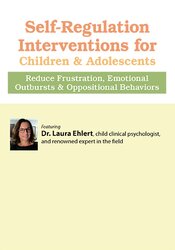
×

This training will help you to better intervene with the challenging child—the one who won’t sit still; doesn’t follow directions; often throws tantrums; or has difficulty waiting for their turn. They may “hit first and ask questions later”. They react impulsively and have difficulty expressing what they need or what is frustrating them. We know this child is intelligent, caring and kind, but their behavior doesn’t reflect these positive qualities. These are the children who confuse and frustrate parents and who overwhelm teachers and peers. They struggle to meet basic expectations and are unable to succeed in school, with peers and at home.
Watch clinical psychologist Dr. Ehlert and learn to effectively intervene with the emotional and behavioral dysregulation of children with High-Functioning Autism, ADHD, Learning Disabilities and Sensory Processing Disorders. Through hands-on activities and dynamic discussion, you will learn techniques, behavioral strategies, problem-solving strategies and brain training exercises to:
Purchase now. Walk away with proven emotional, behavioral and processing strategies that lead to social and academic success!
All members of the PESI, Inc. planning committee have provided disclosures of financial relationships with ineligible organizations and any relevant non-financial relationships prior to planning content for this activity. None of the committee members had relevant financial relationships with ineligible companies or other potentially biasing relationships to disclose to learners. For speaker disclosures, please see the faculty biography.
Continuing education credit information is coming soon for this non-interactive self-study package.
CEs may be available for select professions, as listed in the target audience. Hours will be dependent on the actual recording time. Please check with your state licensing board or organization for specific requirements.
There may be an additional fee for CE certificates. Please contact our Customer Service at 1-800-844-8260 for more details.
**Materials that are included in this course may include interventions and modalities that are beyond the authorized practice of your profession. As a licensed professional, you are responsible for reviewing the scope of practice, including activities that are defined in law as beyond the boundaries of practice in accordance with and in compliance with your professions standards.
| File type | File name | Number of pages | |
|---|---|---|---|
| Manual - Self-Regulation Interventions for Children & Adolescents (2 MB) | 113 Pages | Available after Purchase | |
| Extra Handout Supplemental Slides (1.4 MB) | 58 Pages | Available after Purchase | |
| Illinois Educators Self-Study Instructions (15.4 KB) | 1 Pages | Available after Purchase | |
| Illinois Educators Evaluation Form.pdf (1.2 MB) | 1 Pages | Available after Purchase |

Laura Ehlert, PsyD, is a child clinical psychologist who has worked with children and adolescents with severe emotional/behavioral issues for over 25 years. She maintains a private practice in Burnsville, Minnesota, where she specializes in working with clients who struggle with information and sensory processing deficits and associated emotional, behavioral and mental health issues. Over the years, Dr. Ehlert has worked with thousands of youths in a variety of settings including hospitals, residential treatment centers, partial hospital programs, school day treatment and outpatient mental health settings. She holds a doctorate degree in clinical psychology where her training focused on developmental issues of childhood, and child psychopathology issues. Professionals who have worked with Dr. Ehlert in the past have often commented that interventions she offers succeeded where others have failed.
Speaker Disclosures:
Financial: Laura Ehlert maintains a private practice. She receives a speaking honorarium and recording royalties from PESI, Inc. Laura has no relevant financial relationships with ineligible organizations.
Non-financial: Laura Ehlert is a member of the Minnesota Psychological Association.
Access never expires for this product.
For a more detailed outline that includes times or durations of time, if needed, please contact cepesi@pesi.com.
Visit our FAQ page at https://www.pesicanada.ca/faq or contact us at https://www.pesicanada.ca/contact-us.
| 5 |
|
| 4 |
|
| 3 |
|
| 2 |
|
| 1 |
|
Satisfaction Guarantee
Your satisfaction is our goal and our guarantee. Concerns should be addressed to info@pesicanada.com.
Please wait ...